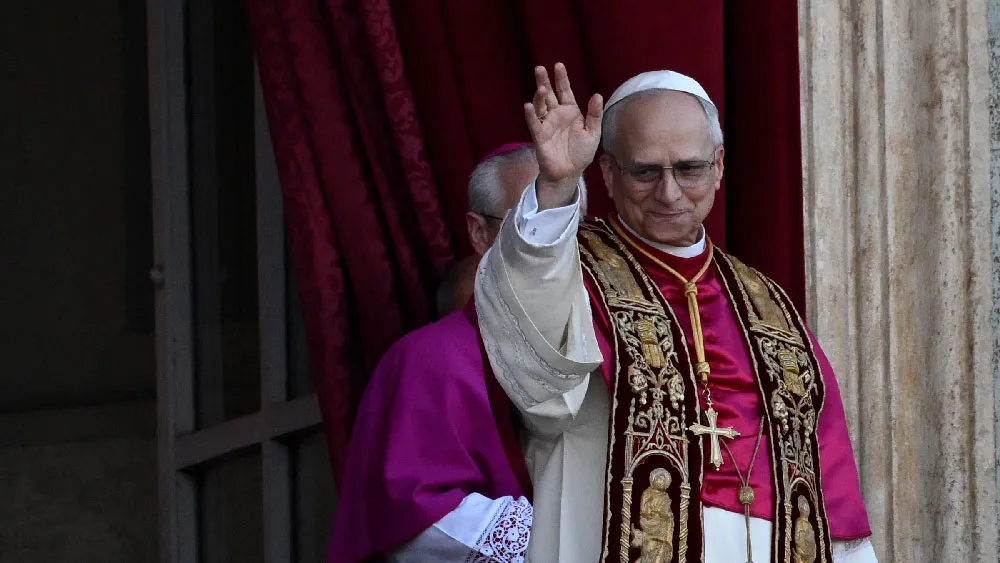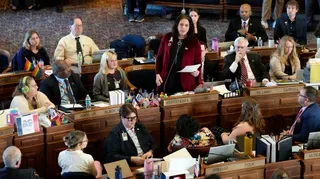May 2, 2015
Marriage Advocates Optimistic of Supreme Court Win
Kilian Melloy READ TIME: 4 MIN.
Same-sex marriage legal advocates who were at Tuesday's oral arguments at the U.S. Supreme Court expressed optimism that Justice Anthony Kennedy will once again come through with the majority vote.
The first question from the justices was about the rights of states to regulate marriage and, although attorneys for same-sex couples tried numerous times to refocus attention to the damage that bans on same-sex marriage inflict on the rights of LGBT people, the focus stayed largely on states' rights throughout the argument.
The court seemed split on the second question of whether a state can refuse to recognize a marriage license from another state.
Bay Area residents who attended a rally on the steps of San Francisco City Hall Tuesday evening expressed excitement at the historic court arguments.
"It's a tremendous moment and a watershed moment that I thought I would never see," said Paul Matzne, 70, a gay man who's a retired museum curator and lives in Oakland.
Others at the rally didn't see the court hearing as the final word on the matter.
Attorney Mary Bonauto speaks to reporters outside the U.S. Supreme Court. Photo: Rudy K. Lawidjaja
"I don't think this is the end but it is a really momentous step because everyone needs equal rights," said Kristina Cole, 36, a lesbian and business owner.
In Washington, D.C., Kate Kendell, executive director of the San Francisco-based National Center for Lesbian Rights, which helped represent same-sex couples from Tennessee, said she thinks there's "no doubt" the court will find that states have to recognize other states' marriages.
"I do think things look favorable" for striking down state bans on same-sex marriage, said Kendell on the plaza outside the court after the argument. "Kennedy is always the swing."
Kendell acknowledged that Kennedy seemed "more inscrutable here than he was in the DOMA case," the 2013 case in which a majority of justices struck down a key provision of the Defense of Marriage Act.
"He didn't really tip his hand. He asked difficult questions of both sides," said Kendell. "But even if it's sooner than he wants to or the court is not entirely comfortable with it, I believe ... when push comes to shove, I do not believe this is a justice who is going to allow Romer v. Evans and Lawrence v. Texas and the Windsor decision to come up full stop and not have that legacy finished."
Kennedy wrote the majority decision in all three cases, striking down a voter-approved initiative in Colorado, striking down state laws banning intimate relations between same-sex couples, and gutting DOMA.
Jon Davidson, legal director for Lambda Legal Defense and Education Fund, said he was encouraged by Kennedy's comparison of Brown (school desegregation) and Loving (interracial marriage) to Lawrence and this appeal. And he thought it "odd" that Justice Samuel Alito "tried to make this point about Greece."
He was referring to Alito's comments that ancient Greek civilization acknowledged same-sex relationships but reserved marriage for heterosexual couples.
"Sometimes, it just seems like they're playing with you," said Davidson.
Others mentioned other surprising points that the justices raised.
"I was surprised that they focused so much at the beginning about this millennia this or that - that's not how you decide the law. That's not the basis for constitutional jurisprudence," said Abby Rubenfeld, former legal director for Lambda Legal and one of the attorneys representing plaintiffs from the Tennessee case.
Rubenfeld said she was pleasantly surprised to hear Chief Justice John Roberts ask "an interesting sex discrimination question."
In questioning John Bursch, special assistant attorney general for Michigan, Roberts said he wasn't sure it was necessary to get into the issue of sexual orientation discrimination to resolve the case.
"If Sue loves Joe, and Tom loves Joe, Sue can marry him and Tom can't," said Roberts. "And the difference is based upon their different sex. Why isn't that a straightforward question of sexual discrimination?"
Bursch said laws banning same-sex couples from marrying do not treat classes of men and women differently. And, he said, a 2001 Supreme Court ruling in Nguyen v. Immigration and Naturalization Services held that "it's appropriate to draw lines based on sex if it's related to biology." (Kennedy wrote that 5-4 majority opinion, saying a law that provided citizenship to children if their biological mothers were American, but not if only their fathers were American, was unconstitutional.)
Justice Ruth Bader Ginsburg interjected that the reason behind that sex discrimination was that "we know who the [biological] mother is" and was intended to avoid the possibility that a man might claim to be the father in order to gain some benefits.
If the state laws were seen as sex discrimination, the court would impose a higher standard of judicial scrutiny than mere rational basis. Laws disadvantaging people based on gender must be justified with - not just a rational reason but - an important governmental interest.
Evan Wolfson, head of the national Freedom to Marry organization, said Kennedy's questions "invited our advocates to make the case about the newness and relative evolution" of the issue.
"He also asked key questions about the kids. He pointed out the illogic of some of the states' positions. And at the end of the day," said Wolfson, "arguments are arguments and what counts is what they're going to go back and do, read these briefs, and write the arguments, build on the law, and write the opinion. And Justice Kennedy has a long and serious legacy to build on here and I hope he does the right thing."
Chris Huqueriza contributed to this report.
Kilian Melloy serves as EDGE Media Network's Associate Arts Editor and Staff Contributor. His professional memberships include the National Lesbian & Gay Journalists Association, the Boston Online Film Critics Association, The Gay and Lesbian Entertainment Critics Association, and the Boston Theater Critics Association's Elliot Norton Awards Committee.





